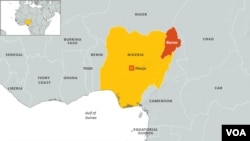MAIDUGURI —
Islamist militants stormed a village in remote northeast Nigeria on Monday, torching houses and spraying them with bullets in an attack that killed 18 people, witnesses said.
The latest Boko Haram assault, on Sunday night, came hours before Nigeria's four top military chiefs handed over to fresh commanders in a ceremony on Monday.
President Goodluck Jonathan announced the reshuffle of his entire military leadership last week in a bid to reinvigorate the fight against the insurgents.
“Most of those who survived the attack have fled the village as they do not know if they will be attacked again,” said Bulama Ibrahim, the chief of Alau Ngawo village, which was attacked sometime after 10 p.m. on Sunday. He said he had counted 18 bodies after the shooting and many houses burned.
A former local councilor, Mustapha Galtimare, who was on the scene after the attack, concurred with the numbers of dead.
The village lies in remote northeastern Borno state, the epicenter of the insurgency and relic of Nigeria's oldest medieval Islamic caliphate, which once prospered from trans-Saharan trade routes passing though the largely Muslim north.
Boko Haram is fighting to re-establish an Islamic kingdom in northern Nigeria, breaking away from the largely Christian south. Its fighters have killed thousands of people since they launched an uprising in mid-2009.
“They had been in the village for nearly two hours without any security personnel coming to the aid of the villagers,” Ibrahim said.
A military spokesman in Borno state, Colonel Muhammadu Dole, said he was aware of the attack but had no details.
Jonathan declared a state of emergency in the northeast last May and ordered in extra troops and air strikes on Islamist bases. It appeared to quell the violence at first, but as is often the case, the insurgents reemerged from the shadows and are now more open in their targeting of civilians.
Boko Haram remains the most serious security headache to Africa's top oil producer and second biggest economy, although the military offensive has squeezed them into smaller pockets along the Cameroon border.
On Dec. 2 Boko Haram gunmen stormed the air force base and military barracks around the airport of the northeastern city of Maiduguri. The group was also blamed for a car bomb in the city this week that killed 29 people.
The latest Boko Haram assault, on Sunday night, came hours before Nigeria's four top military chiefs handed over to fresh commanders in a ceremony on Monday.
President Goodluck Jonathan announced the reshuffle of his entire military leadership last week in a bid to reinvigorate the fight against the insurgents.
“Most of those who survived the attack have fled the village as they do not know if they will be attacked again,” said Bulama Ibrahim, the chief of Alau Ngawo village, which was attacked sometime after 10 p.m. on Sunday. He said he had counted 18 bodies after the shooting and many houses burned.
A former local councilor, Mustapha Galtimare, who was on the scene after the attack, concurred with the numbers of dead.
The village lies in remote northeastern Borno state, the epicenter of the insurgency and relic of Nigeria's oldest medieval Islamic caliphate, which once prospered from trans-Saharan trade routes passing though the largely Muslim north.
Boko Haram is fighting to re-establish an Islamic kingdom in northern Nigeria, breaking away from the largely Christian south. Its fighters have killed thousands of people since they launched an uprising in mid-2009.
“They had been in the village for nearly two hours without any security personnel coming to the aid of the villagers,” Ibrahim said.
A military spokesman in Borno state, Colonel Muhammadu Dole, said he was aware of the attack but had no details.
Jonathan declared a state of emergency in the northeast last May and ordered in extra troops and air strikes on Islamist bases. It appeared to quell the violence at first, but as is often the case, the insurgents reemerged from the shadows and are now more open in their targeting of civilians.
Boko Haram remains the most serious security headache to Africa's top oil producer and second biggest economy, although the military offensive has squeezed them into smaller pockets along the Cameroon border.
On Dec. 2 Boko Haram gunmen stormed the air force base and military barracks around the airport of the northeastern city of Maiduguri. The group was also blamed for a car bomb in the city this week that killed 29 people.





